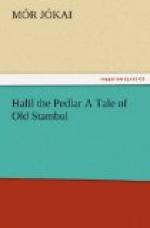The Sultan had all at once become very grave.
“Why didst thou trouble me with these words!” he exclaimed.
“I do but repeat the words of the Sultana, greatest of Padishahs. She says thou art off to the wars, that thou wilt return no more, and that she will not be the slave-girl of the monarch who shall come after thee and sit upon thy throne.”
“Wherefore dost thou trouble me with these words?” repeated the Sultan.
“May my tongue curse my lips, may my teeth bite out my tongue because of the words I have spoken. ’Twas the Sultana that bade me speak.”
“Go back to her and tell her to come hither!”
“Such a message, oh, my master, will be her death. She will not leave her chamber alive.”
For a moment the Sultan reflected, then he asked in a mournful voice:
“What thinkest thou?—if thy house was on fire and thy beloved was inside, wouldst thou put out the flames, or wouldst thou not rather think first of rescuing thy beloved?”
“Of a truth the extinguishing of the flames is not so pressing, and the beloved should be rescued.”
“Thou hast said it. What meaneth the firing of cannons that strikes upon my ears?”
“Salvoes from the host.”
“Can they be heard in the Seraglio?”
“Yea, and the songs of the singing-girls grow dumb before it.”
“Conduct me to Adsalis! She must not die. What is the sky to thee if there be no sun in it? What is the whole world to thee if thou dost lose thy beloved? Go on before and tell her that I am coming!”
The Kizlar-Aga withdrew. Achmed muttered to himself:
“But another second, but another moment, but another instant long enough for a parting kiss, but another hour, but another night—a night full of blissful dreams—and it will be quite time enough to hasten to the cold and icy battlefield.” And with that he hastened towards the harem.
There sat the Sultana with dishevelled tresses and garments rent asunder, without ornaments, without fine raiment, in sober cinder-coloured mourning weeds. Before her, on a table, stood a small goblet filled with a bluish transparent fluid. That fluid was poison—not a doubt of it. Her slave-girls lay scattered about on the floor around her, weeping and wailing and tearing their faces and their snowy bosoms with their long nails.
The Padishah approached her and tenderly enfolded her in his arms.
“Wherefore wouldst thou die out of my life, oh, thou light of my days?”
The Sultana covered her face with her hands.
“Can the rose blossom in winter-time? Do not its leaves fall when the blasts of autumn blow upon it?”
“But the winter that must wither thee is still far distant.”
“Oh, Achmed! when anyone’s star falls from Heaven, does the world ever ask, wert thou young? wert thou beautiful? didst thou enjoy life? Mashallah! such a one is dead already. My star shone upon thy face, and if thou dost turn thy face from me, then must I droop and wither.”




